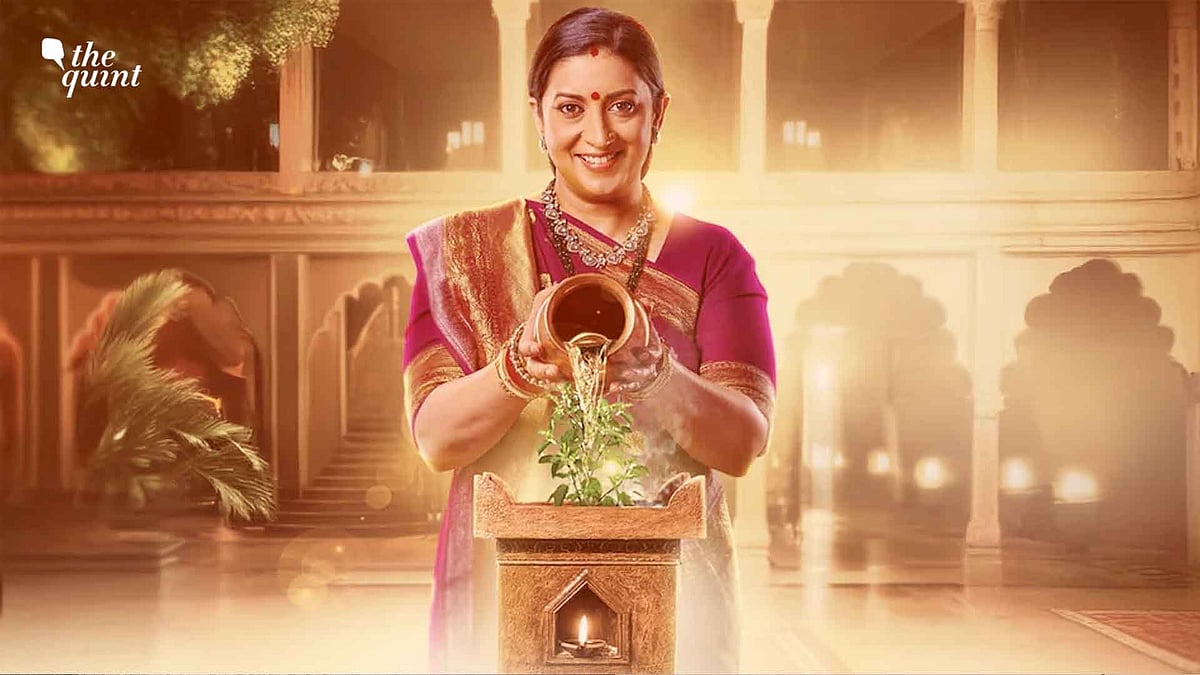
Smriti Irani’s Tulsi Returns, with Hindutva’s Stamp of Womanhood
Kyunki remains stubbornly committed to its conservative vision, writes Farnaz Fatima.

advertisement
When Kyunki Saas Bhi Kabhi Bahu Thi first aired in 2000, it was nothing short of a cultural moment. People welcomed the Virani family into their homes, and, Tulsi Virani, their self-sacrificing daughter-in-law, became the gold standard of Indian womanhood.
Now, in 2025, as the show returns to our lives with a reboot, little has changed except, perhaps, the world around us.
The reboot opens with a two-minute montage of temples, aartis, and deities before panning to Tulsi (Smriti Irani) praying to the tulsi plant in her garden.
Tulsi is still the axis around which the family revolves, still the repository of tradition, still expected to bear the emotional and physical labour of holding the household together.
The Unchanged Burden of the Ideal Woman
Within minutes of the first episode, the show’s regressive tropes resurface with startling clarity. Tulsi’s grown son, played by Hiten Tejwani, calls out to her from the bathroom for a towel. The scene plays out without irony as a middle-aged man still relies on his mother’s servitude. Meanwhile, Tulsi declares that food tastes better when it is prepared by bahu-betis with love, a line that could have been lifted verbatim from the original series.
In a telling scene, when Mihir (the husband, now a protein-shake paglu) discovers that their daughter has fallen for someone against the family’s wishes, his immediate reaction is not introspection or dialogue, but rage directed squarely at Tulsi. “Din bhar ghar mein karti kya ho? (What do you at home all day?)" he snaps, as if the moral failings of their children are solely her responsibility.
The implication is clear. The home is her domain, and thus, every flaw in its order is her failure alone.
The show’s unapologetic nostalgia is not only for a bygone era of television but also for a bygone social order, one that the current political climate is laboriously reconstructing.
The Paradox of Smriti Irani
The most striking dissonance lies not just in the show’s outdated ideals, but in the woman who embodies them. We knew Smriti Irani as Tulsi before we knew her as Smriti Irani, the person.
The gap between the real and the reel is jarring. It is difficult to get on-board with her playing a character who finds empowerment only in self-erasure.
But perhaps this is not a contradiction at all. Perhaps this is the point. Hindutva’s ideal woman is both militant and maternal, according to convenience. She is both Durga and Sita, depending on what will aid the power establishment. She sanctifies the system rather than challenge it at any point.
Conservatism in the Age of Streaming Plurality
The return of Kyunki is particularly striking in contrast to the landscape of Indian streaming platforms, where shows have pushed boundaries on caste, class, gender, sexuality and other systems of power and oppression. Even mainstream television has seen glimmers of change. Anupama, for all its flaws, at least acknowledges the frustrations of a neglected housewife.
In one scene, Tulsi’s daughter-in-law proudly announces that the grandchildren have donated to the National Defence Fund as an anniversary gift for her—a moment that blends familial duty with nationalist sentiment, reinforcing the idea that a “good” Indian is one who upholds and merges domestic and patriotic ideals.
The show’s religious sentiments are political. The ritual and symbols have an unspoken alignment with a majoritarian ethos.
Mother as the Guardian of Tradition
The reboot also arrives at a time when India’s political and cultural discourse is steeped in anxiety about wayward youth who are increasingly urban, influenced by Western media and (supposedly) detached from sanskar.
The solution lies in Tulsi Virani, the archetypal Hindu mother whose parvarish (upbringing) of her children is rooted in cultural preservation. In the new episodes, her grown children may be adults, but their values remain firmly rooted in her teachings: respect for elders, devotion to tradition and an unshakable commitment to familial duty.
Here, the mother is the first line of defence against cultural dilution. In a Hindutva-driven India, where the fear of modern youth fuels political rhetoric, Tulsi’s return is a reassertion of the Hindu woman’s oldest role: not just to raise children, but to mould citizens perfect for the nation.
The message is that if the nation’s future rests on its youth, then the mother must ensure they never stray from the right path. And what is that path?
Is Indian television’s imagination truly so stagnant? Or does the show endure because it reflects a deeper societal reluctance to let go of these myths? In an era of deep political and cultural polarisation, the return of Kyunki feels like a project of re-education.
The show’s refusal to adapt suggests that for many, these ideals are not just entertainment but instruction.
Nostalgia as a Shield Against Critique
The reboot of Kyunki Saas Bhi Kabhi Bahu Thi banks on nostalgia that makes viewers overlook its core. Younger audiences might tune in ironically, laughing at the melodrama or reminiscing about family TV nights in the 2000s, but this very fondness acts as a shield against critique.
When entertainment becomes a cozy time capsule, it escapes accountability, and in a culture already resistant to change, that complacency is its own kind of surrender. We forgive, we meme, we binge, and in doing so, we grant these narratives permission to endure unchallenged.
(Farnaz Fatima has a postgraduate degree in Politics and International Studies. Currently working in advertising, she is interested in exploring the intersections of gender, mental health and popular culture through her writing. This is an opinion piece, and the views expressed are the author’s own. The Quint neither endorses nor is responsible for them.)
- Access to all paywalled content on site
- Ad-free experience across The Quint
- Early previews of our Special Projects
Published: undefined